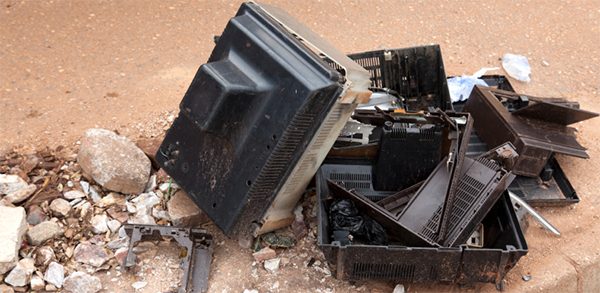
By Sophia Bennett January 22, 2014
The playground in Agbogbloshie, Ghana is on fire.
Thick black smoke pours from a pile of burning electronic waste. Mixed in the smoke are vapors from the dozens of harmful chemicals found in electronics, including mercury, arsenic and chemical fire retardants.
The occurrence isn’t uncommon. Afua Hirsch, a reporter for the U.K.’s Guardian newspaper, reports that Agbogbloshie is one of many locales where richer nations (in this case, mostly European) dump their unwanted electronic goods. Although the European Union strictly prohibits exporting electronic waste to Third World countries, plenty of shipments sneak through busy ports and end up in places with poorly enforced or even nonexistent regulations.
Hirsch describes the piles of trash at Agbogbloshie — a community that thousands of people call home — as stretching “as far as the eye can see.” Many of the people working at the site are children. Teenagers set fire to things like old VCRs, tape players and computers to remove the plastic, making it easier to access the metal. Young boys remove and sort aluminum, gold and other metals from the shells of copy machines and major appliances. Younger children trail strings with magnets attached to pick up overlooked scraps of steel and copper. Even babies end up at the dumpsite, tied to the backs of young women selling food and water to workers.
Health problems abound in Agbogbloshie. “I would like to go back home, but my family needs the money, so I stay,” says 19-year-old Abdoullaye. “We get too many problems here — sometimes I have to go to the hospital. It’s not good for us.”
And, in the midst of all this toxic waste, a group of boys has cleared an area where they can play soccer, their laughter at odds with the horror all around them.
The problem is not unique to Africa. A recent United Nations report says China is the world’s largest recipient of illegally dumped electronic waste, with much of it concentrated in the southeastern town of Guiyu. Much of this waste comes from elsewhere in the world, but some is domestically generated. About 20% of the country’s e-waste comes from its own consumers, who are buying electronic goods in record numbers. In addition, given that China is one of the world’s largest producers of electronic goods, plenty of industry castoffs find their way into China’s waste stream.
India, Pakistan and Sri Lanka also see massive volumes of old electronics that are hand dismantled by women and children using primitive tools. In some cases, these goods are passed off as secondhand materials to make importing and exporting easier. In reality, they simply end up in the sea of e-waste clogging fields and towns.
Many states that mandate electronic waste recycling, including Connecticut and Oregon, prohibit dealers from dumping unwanted goods in Third World countries. But, those states also have shifty business owners looking to make a quick buck on the backs of some of the world’s poorest people.
In 2009, Greenpeace, Sky News and The Independent newspaper exposed that a company contracting with a government-run British waste transfer station was, in fact, illegally shipping electronics to Lagos, Nigeria — another major dumping ground for electronics at the end of their usable life. That is why it is vital to ensure that your unwanted electronics are going to a reputable business committed to responsible recycling.
How does one find such a company? In the U.S., there are two independent, third-party certification programs that signify companies are disposing of electronics properly. E-Stewards, run by the nonprofit Basel Action Network, is the most rigorous program.
To meet e-Stewards standards, companies must guarantee they do not ship products to Third World countries, use sweatshop or child labor, incinerate any products or dump goods illegally in landfills. They are also required to have a process in place for destroying any personal data left on machines as a measure of protecting consumer privacy. ERI is proud to be one of 14 companies and six charitable foundations that help fund the creation and implementation of this great set of guidelines. To find an e-Stewards-certified recycler near you, check out this handy interactive tool. The e-Stewards program is also available in Canada.
Responsible Recycling Practices (R2) is the other well-known certification program. The program does allow export of electronics, but everyone involved must follow strict standards to make sure that export and import happens legally and responsibly. If goods are shipped out of the U.S. for reuse, the recycler must demonstrate that the item is still functioning. Similar to the e-Stewards program, companies must guarantee that they protect people’s privacy by destroying any personal information that may still be on machines. A map of R2-certified recyclers is available here. ERI is R2 certified as well.